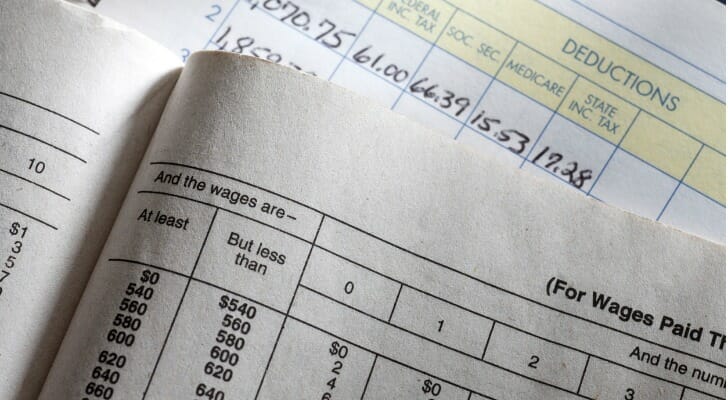 The federal government has launched a wide-ranging set of initiatives to help individuals and businesses dealing with the coronavirus pandemic. A number of these initiatives, found in the $2 trillion stimulus bill known as the CARES Act, focus on aid to businesses. While many, such as the Paycheck Protection Program, involve grants and loans to struggling businesses, others involve some kind of tax relief. Here are all the tax credits and other business tax changes that business owners should be aware of.
The federal government has launched a wide-ranging set of initiatives to help individuals and businesses dealing with the coronavirus pandemic. A number of these initiatives, found in the $2 trillion stimulus bill known as the CARES Act, focus on aid to businesses. While many, such as the Paycheck Protection Program, involve grants and loans to struggling businesses, others involve some kind of tax relief. Here are all the tax credits and other business tax changes that business owners should be aware of.
Employee Retention Tax Credit
A business forced to close its doors temporarily due to COVID-19 can get a tax credit equal to 50% of wages paid to eligible employees during the quarter the closure happened. Businesses that suffered sales declines of 50% or more can also claim this credit.
The Employee Retention Tax Credit is based on the amount of wages paid per quarter, up to a maximum of $10,000 per employee in compensation, including health plan expenses. Any size business can use the credit, although the way qualified wages are defined is different for businesses with fewer than 100 workers. But for any business, there’s a cap of a $5,000 credit per employee (50% of the claimed wages up to $10,000).
Under the provision, eligible employers must maintain a business or trade during the 2020 calendar year that either:
- Fully or partially suspends operation during any calendar quarter in 2020 due to orders from an appropriate governmental authority limiting commerce, travel, or group meetings (for commercial, social, religious, or other purposes) due to COVID-19; or
- Experiences a significant decline in gross receipts during the calendar quarter
Employer Payroll Tax Delay

Both the federal government and some states collect payroll taxes, and the tax is based on employees’ tips, wages or salaries. These taxes are then used by the government to finance programs like Social Security and Medicare. Employers deduct these taxes from their employees’ overall earnings and pay them to the IRS.
The CARES Act granted businesses a payroll tax delay. Employers can delay paying their portion of employees’ Social Security taxes during the rest of 2020. This amounts to 6.2 percent of wages. It’s not a gift, however, just a grace period. Employers will have until Dec. 31, 2021, to make up half of the delayed taxes, and until Dec. 31, 2022, to come up with the other half. Most employers will qualify for the payroll tax delay.
Increased Business Interest Limit
Businesses that are paying interest on loans will get a boost from an increase in the amount of interest they can deduct. The change raises the amount of deductible interest from 30% of adjusted taxable income to 50% of adjusted taxable income. The deduction increase is good for 2019 and 2020.
This may not offer much help to businesses that are, due to a drop in sales, already experiencing lower taxable income. However, those with lots of debt will potentially get a cash flow boost and pay less after taxes for their financing.
Alternative Minimum Tax (AMT) Credit
The 2017 Tax Cuts and Jobs Act got rid of the corporate Alternative Minimum Tax starting in 2018, while allowing corporations to apply unused AMT credits to reduce their tax liability over a four-year stretch through 2021. The CARES Act does that one better, letting companies immediately claim a refund of AMT credits on their return for either 2018 or 2019, rather than having to wait.
Qualified Improvement Property (QIP) Fix
The CARES Act resolves a problem in the wording of the Tax Cuts and Jobs Act (TCJA) of 2017. The TCJA expanded bonus depreciation rules to allow a 100% write-off for certain property acquired after Sept. 27, 2017, and placed in service before Jan. 1, 2023. However, because of a drafting error in the TCJA, lawmakers unintentionally excluded QIP from bonus depreciation eligibility.
The CARES Act fixes that error with a technical amendment so now businesses can immediately deduct 100% of the cost of improving facilities, rather than having to depreciate improvements over 39 years. This part of the CARES Act is likely to be of special financial benefit to the hard-hit retail and hospitality industries, including restaurants.
Net Operating Losses (NOL) Credit
 Businesses that generated a net operating loss (NOL) in 2018, 2019 or 2020 can now carry that loss back up to five years. This change can potentially create a sizable tax windfall because tax rates before 2018 were significantly higher than they are now. Another stipulation of the CARES Act suspends until 2021 the limit on NOL deductions greater than 80% of taxable income.
Businesses that generated a net operating loss (NOL) in 2018, 2019 or 2020 can now carry that loss back up to five years. This change can potentially create a sizable tax windfall because tax rates before 2018 were significantly higher than they are now. Another stipulation of the CARES Act suspends until 2021 the limit on NOL deductions greater than 80% of taxable income.
Although the net effect of easing the NOL will be positive for many businesses that have applicable losses, some business owners may find that using the new NOL credit limits their ability to use some other income-related deductions they may have taken on those past-year returns. They may also need to file amended state returns for past years, since state returns often use income figures from federal returns.
The Bottom Line
The CARES Act offers businesses of all sizes tax relief in coping with the financial fallout of COVID-19. The CARES Act is a massive, hastily passed stimulus bill, so it will take time for all the ramifications of the COVID tax breaks to become clear. But overall they appear to promise a sizable benefit for COVID-impacted businesses.
Tips on Paying Taxes
- Consider working with a financial advisor experienced in business tax issues. Finding the right financial advisor who fits your needs doesn’t have to be hard. SmartAsset’s free tool matches you with financial advisors in your area in five minutes. If you’re ready to be matched with local advisors who will help you achieve your financial goals, get started now.
- If your income has changed as a result of the coronavirus pandemic, the taxes you owe are likely to change too. Use SmartAsset’s income tax calculator to see what you may end up owing.
Photo credit: ©iStock.com/damircudic, ©iStock.com/DNY59, ©iStock.com/nzphotonz